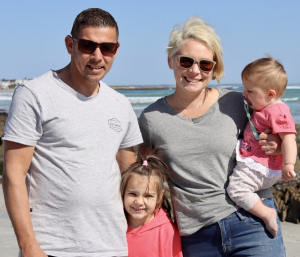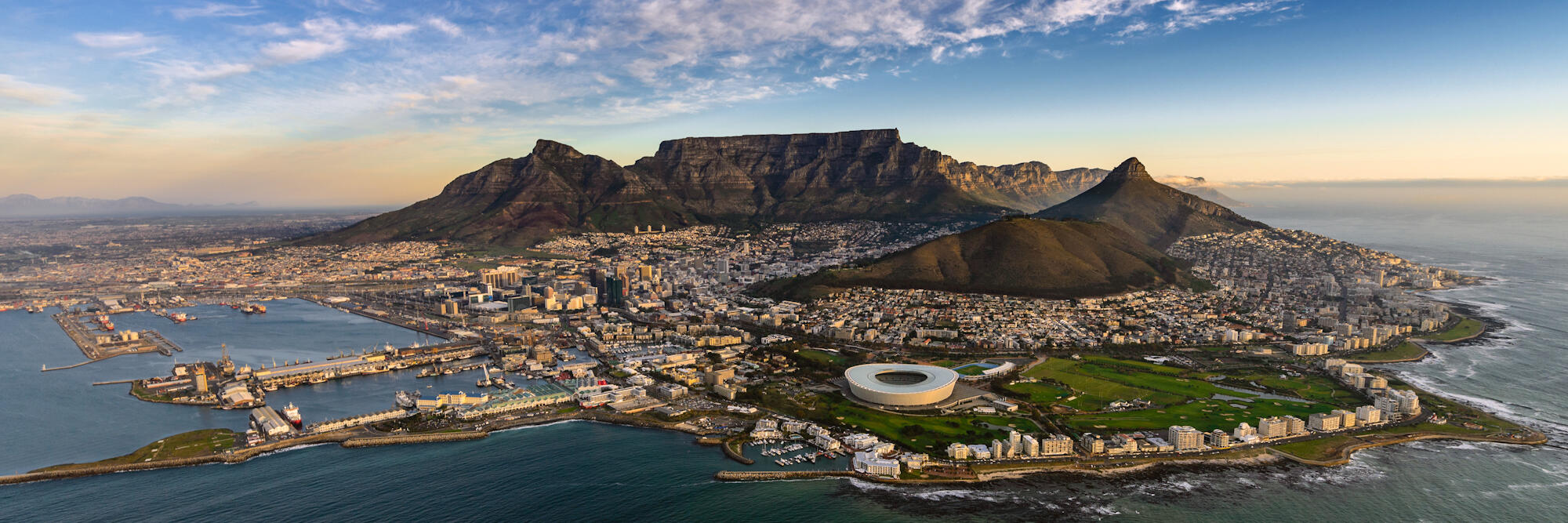Keiley is a British expat and a mother of two. She is happily married and living in the Northern Suburbs of Cape Town. She has recently started a blog, Brit in the Burbs, to share her experience with other expats thinking of making the move. She can also be found on Instagram (@britintheburbs).
About Keiley
Q: Where are you originally from?
A: England – Essex, to be precise.
Q: Where are you currently living?
A: In Durbanville, Cape Town.
Q: When did you move here?
A: 2012
Q: Is this your first expat experience?
A: Yes
Q: Did you move here alone or with a spouse/family?
A: With my husband.
Q: Why did you move; what do you do?
A: My husband is from Cape Town and was living in London when we met 15 years ago. After dating for a few years, we decided to get married and come live in South Africa so he could show me his home town. Eight years and two daughters later, we are still here.
Living in Cape Town
Q: What do you enjoy most about Cape Town and South Africa? How would you rate the quality of life compared to the UK?
A: Like most British expats, I’m chasing the sun. I just love the warm weather and outdoor lifestyle. I think the quality of life here is better because there is more of a work-life balance. The pace is much slower and it feels like you have more time to really LIVE.
Q: Any negative experiences? What do you miss most about home?
A: Any interaction with government admin (i.e. Home Affairs, SARS, the Traffic Department) is so painful it gives me a cold sweat. So, I miss the ease of doing things and being able to ‘trust’ in the system. But of course what I miss the most is my family. The time difference is short so it means it’s easy to keep in touch on the phone, but the flights home are SO expensive that it makes it very hard to visit regularly. You also get very little annual leave here, so it's hard to take time off work for a long haul visit home.
Q: What are the biggest adjustments you had to make when settling into expat life here? Did you experience any particular elements of culture shock?
A: We live in Durbanville which is a very Afrikaans community, so the language barrier was quite hard. Especially in social situations and simple interactions in the supermarket. My Afrikaans has improved a lot but I’m still not fluent, so I’ve just become used to only being able to follow half the story.
Q: What’s the cost of living compared to home? Is there anything particularly expensive or particularly cheap in South Africa compared to the UK?
A: I think the cost of living is much lower, but there is less disposable income. I feel like the rising municipality costs, school fees and medical aid just eat up my salary. I love how cheap wine is (especially living in the Winelands) but anything imported is much more expensive. I’m still shocked every time I see how much perfume costs. It’s insane – it’s double the price of the UK! Also cars are extremely expensive and very few people buy cars cash; it’s all on credit.
Q: How would you rate the public transport in Cape Town?
A: To be honest, I’ve never used it. I’m lucky enough to have a car and work quite close to home.
Q: How would you rate the healthcare in Cape Town? Have you had any particularly good/bad experiences with regards to doctors and hospitals?
A: The standard of medical care I have received has always been exceptional. I feel very privileged to be able to afford private health care. It obviously comes at a high cost and the government hospitals are nowhere near the same standard.
In the UK the NHS is under severe strain and the waiting times for any medical services are so long. You can wait weeks for a GP appointment and months for any specialist appointment. Here it’s very different; you can get appointments very quickly and very good specialists are easily accessible.
I’ve had both my babies here at Durbanville Mediclinic and I honestly felt like I was staying in a hotel compared to some of the hospitals in England.
Q: What are the biggest safety issues facing expats living in Cape Town and South Africa in general?
A: Cape Town can be very dangerous if you are not careful. The inequality gap is huge, and the rich and poor live alongside each other which means theft and muggings are common. So, don’t flaunt your valuables and keep your wits about you. Don’t walk down the street on your cell phone, lock your car doors, don’t go into areas known to be dangerous. Just be sensible.
Q: How do you rate the standard of housing in Cape Town? What different options are available for expats?
A: I think it’s the same in most cities. The city centre apartments are quite small with little outdoor space and no parking, and the houses in the suburbs are much more spacious and you get more for your money.
Q: Any cities, areas or suburbs you’d recommend for expats to live in?
A: I live in Durbanville in the Northern Suburbs which I LOVE. It’s part of the Winelands, so it’s very pretty and green and it has a small village vibe. There are lots of lovely shops and restaurants too. I do, however, wish we had lived in the Cape Town CBD for at least a few months to experience the city life before settling down in the ‘burbs.
Q: Are there any activities, attractions or events that you would recommend for expats moving to Cape Town or South Africa as a whole?
A: I have started hiking which I’m loving. There are so many different routes and they are all stunningly beautiful. There are lots of hiking groups too, so it’s a great way to meet people. There are 13 different ‘peaks’ in Table Mountain National Park – all of varying difficulty. It’s my aim to reach all of them!
Meeting people and making friends
Q: How tolerant are the locals of foreigners? Have you ever experienced discrimination in South Africa?
A: People are often very intrigued and curious when they find out I’m British. Most South Africans want to leave the country, so they find it difficult to understand why I came to live here. I’ve never felt discriminated against. South African people are generally very friendly and welcoming.
Q: Was meeting people and making friends easy?
A: I met most of my friends through my husband’s friends and through work. The braai (barbecue) culture in the suburbs is huge – everyone is always visiting each other for a braai. Which is nice because you get to socialise a lot and meet new people. We love to entertain at our house, so we have people over all the time.
Q: Have you made friends with locals or do you mix mainly with other expats? What advice would you give to new expats looking to make friends with the locals?
A: Most of my friends are locals but I do have a few expat friends. Most expats live in the city, so it’s always a pleasant surprise to bump into another European in the suburbs. If you have children, there are lots of mother-baby groups and kids sports clubs, etc., which is a good way to meet people. And if you don’t have kids then sports and outdoors are the way to go. Hiking, trail running, cycling, etc. There are lots of Facebook groups for those kinds of things.
Working in Cape Town
Q: Was getting a work permit or visa a relatively easy process? Did you tackle the visa process yourself, or did you enlist the services of an immigration consultant?
A: It wasn’t very easy when I first arrived and I did everything myself through home affairs. I’m very good at admin and that kind of thing, so I didn’t want to pay consultant fees. I also had my visa come back with errors on it several times, so it was very stressful and the waiting times are long. So, if you are uncomfortable with stuff like that, definitely get an immigration consultant!
Q: What is the economic climate in Cape Town like? Do you have any tips for expats looking to find a job?
A: The economy is struggling and it’s even worse since Covid. It is very hard to find a job. I am an Executive PA and I found that a lot of the big corporates like the fact that I have overseas experience, so I was lucky. It definitely helps if you have international companies on your CV.
My husband and a lot of my friends have started their own businesses. There is relatively little red tape for start-ups, and Cape Town is quite small, so it’s easy to make connections. It’s a great place to be an entrepreneur!
Q: How does the work culture differ from home?
A: The biggest difference in work culture for me was the socialising. Coming from London, it was normal to have regular ‘after work drinks’ with colleagues. People don’t really do that here.
Also the working day starts much earlier. Its not uncommon to be in the office at 7.30am.
Family and children
Q: What are your favourite family attractions and activities in Cape Town?
A: One of the things I love the most is that SOOO many restaurants and wine farms have play areas for kids. So, it makes it very easy to go out and meet friends for coffee or lunch while the kids are entertained. There are also loads of nice places to go for picnics with beautiful views, parks, dams and of course the beach!
Q: What are your favourite family getaway spots?
A: We love to camp and there are literally hundreds of family-friendly camp spots within 2 hours of Cape Town. This means you can have lots of weekends away that don’t cost very much. For longer holidays I love the Garden Route. Wilderness is absolutely beautiful and often gets overlooked because most people go to Knysna. Victoria Bay has to be my favourite beach of all time.
Q: What are the schools like, any particular suggestions?
A: The government schools in the Western Cape are very good. Coming from the UK where school is free, it is an adjustment to pay school fees. Also it was a surprise that school finishes so early in the day (around 1pm). So, you have to arrange for after care at additional cost.
Final thoughts
Q: Is there any advice you would like to offer new expat arrivals to Cape Town?
A: My advice would be to be open minded and explore as much as possible. Be careful and aware of crime but don’t let it stop you experiencing all the country has to offer. Get to know all types of South African people and learn a few words in Afrikaans and Xhosa. The locals appreciate it so much if you say your pleases and thank yous in their language. Also take time to get out of Cape Town and explore the rest of the Western Cape. The Cederberg, the Overberg and the Garden Route are my top 3!
►Interviewed in September 2021



